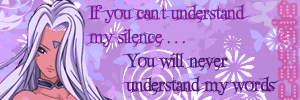|
Japanese Learners Club ^.^
Link |
by
|
|
Konnichiwa! ^.~ To anyone wanting to start learning Japanese or those in the Beginning-Intermediate stages of learning, welcome. This thread is to pool together all the gendounians currently learning Japanese's resources and knowledge so that we can all benefit and learn from each other, making our learning experience more fun and allowing us to practice with each other. More or less, me as well as others who wish to will post information that we are currently learning so that others can learn it too! Also we will share links to good learning resources etc. You may also put up that you would like a practice partner and people interested will PM you, so then you may study together through e-mail, MSN, PM's or whatever! Discussions and questions about things being posted are welcome. ***To any people fluent in Japanese do not hesitate to post and help with people's questions if you wish to and also if you want a study partner to keep your Japanese in tip top shape.*** In short, I am learning Japanese, I wish to help others learn as I do, but I am not a fluent Japanese speaker who can answer all your questions, please try this thread for that. ^.^ Also, if you see where somebody has made a mistake and know the correction, PLEASE tell them (nicely) how to fix it!!! We are here to help each other learn, so don't hold back. As far as the "lessons" I will post, I will be using reliable books I have purchased as source material. But as far as the Japanese I type from my brain it's just my knowledge, so please help me out too! I hope others will join the "club" community and we can all help each other learn Japanese! *If you are new to the thread please give a short introduction (it doesn't have to be in Japanese).* All lessons and links posted in this thread will be gathered and linked to below for quick and convenient accessibility. Lessons Links |
|
Re: Japanese Learners Club ^.^
Link |
by
 on 2007-06-22 10:46:53
on 2007-06-22 10:46:53 |
|
First things first! Jikoshokai! (introduce ourselves!) Boku wa Cassie desu (i am Cassie) North Carolina ni sunde imasu (I live in North Carolina) Anata wa Gakusei desu ka? (Are you a student?) Chugaku Ni nen (i'm in 8'th Grade. or is it ninth grade? it summer i've become brain dead -_-') here is a website to help brush up on the basics: http://home9.highway.ne.jp/timtamie/learning/learningJ2.htm Ganbate Minasai! (i will always put the meaning of what i write in parethasise. Since it's summer i'm doing minimal thinking and it helps me. like i said i've become brain dead -_-') |
|
Re: Japanese Learners Club ^.^
Link |
by
|
|
Atashi (female pronoun) no (possesive particle) namae (name) wa (topic marking particle) Katt desu (copula meaning "=" or "it is"). Juu(10+)hachi (8) sai (years). Canada ni (particle meaning in (among other things)) sunde (reside) imasu (currently). Gakusei (student) ja arimasen (I am not). Anata (Are you)? Mou sugu ni (Soon) daigaku sei (college student) ni narimasu (will be becoming). (Arigatou gozaimashita Asder!) Hajimemashite (Nice to meet you) minasan (everyone)! The first "lesson" will come soon. (Mou sugu ni dai ikka ga kimasu.) I will link all "lessons" on the first post for everyone's convienence. I will also add a link section on the first post to gather all the outside links given. Others are welcome to give lessons too if they have good source material to gather correct information from! |
|
Re: Japanese Learners Club ^.^
Link |
by
|
|
This thread looks interesting... may I join in? Oh and Katt, I'm not sure, but I think this line has a mistake: Mou sugu ni daigaku sei desu. I think it should be: Mou sugu ni daigaku sei ni narimasu. Also, Cassie, if you mean you're an 8th grader, it should be chuugaku ni nen sei. Oh, and forgot to introduce myself: Hajimemashite (How do you do?) Boku (a pretty masculine pronoun, but could also be used by females) wa Asdertygh desu. Chuugaku san nen sei desu. (I'm a 9th grader) Mou sugu ni koukou sei ni narimasu. (Soon, I'll be a high schooler) Minna-san, gokigen ikaga? (Everyone, how are you doing?) Please tell me if I made some mistakes. And one more thing: Yoroshiku onegaishimasu. (I request your cooperation... or something like that)   |
|
Re: Japanese Learners Club ^.^
Link |
by
 on 2007-06-22 18:57:04 (edited 2007-06-23 21:27:07)
on 2007-06-22 18:57:04 (edited 2007-06-23 21:27:07)
|
|
Cool, so this thread is finally up. Hajimemashite?(How do you do?) Boku wa Kiba desu. (I am kiba) Juu(10+) Go (five) nen (years). koukou ichi nen sei (Thanks Asd.) This is gonna be fun^^ 
|
|
Re: Japanese Learners Club ^.^
Link |
by
 on 2007-06-22 21:31:39 (edited 2007-06-22 21:35:13)
on 2007-06-22 21:31:39 (edited 2007-06-22 21:35:13)
|
|
Hajimemashite. Boku wa rebaa desu. (My name is reveh) Juu go sai desu. (Im 15 years of age) Mou sugu ni amerika no kookoo san nensei ni narimasu. (Im going to be a sophomore) |
|
Re: Japanese Learners Club ^.^
Link |
by
|
|
Let me correct some mistakes. @Kiba: 10th grade is "koukou ichi nen sei". There are only 3 grades in junior high school (chuugakkou, grades 7-9) and 3 grades in senior high school (koukou, grades 10-12). In case you haven't known, elementary school is shougakkou and is for grades 1-6. @Reveh: Use "nen" for your age. So your age would be "juu go nen". And isn't "koukou san nen sei" for grade 12, or senior? (I'm not a native speaker of English, and I don't even know what is sophomore, or if it's actually a definition of a grade. Stupid me -_-) Perhaps what you need is "koukou ni nen sei" (grade 11) or "koukou ichi nen sei" (grade 10).   |
|
Re: Japanese Learners Club ^.^
|
|
Hajimemashite(How do you do?) Watashi wa Flora desu. (I am Flora) Juu Roku nen (I am 16 years). Singapore ni sunde imasu(I live in Singapore) Koukou ichi nen sei desu(I am in 10th grade, but in my country we dont call it as grade, how weird haha) |
|
Re: Japanese Learners Club ^.^
Link |
by bluefeather
 on 2007-06-23 10:39:25
on 2007-06-23 10:39:25 |
|
Minasan, hajimemashite Watashi wa mou gakusei ja na i. (I am no longer a student) Nihongo o naratta no wa 3 nen mae desu.(I started learning Jap 3 years ago) Watashi mo singaporean desu! (I am also Singaporean!) Minasan, ogenki desu ka?  |
|
Re: Japanese Learners Club ^.^
Link |
by
|
|
Youkoso, kono kurabu e (Welcome to this club) (Heck, I'm no founder of this club, but just feel the need to say it) @Bluefeather: Don't say Jap, unless you really want to be racist. And, I think it's better to say "I'm also Singaporean" as "Watashi mo Singapore-jin desu".   |
|
Re: Japanese Learners Club ^.^
|
|
konichiwa minnasan Boku wa van desu (Boku refer to boys & watashi refer to girls) Yurushku ne~ ogenki deska? |
|
Re: Japanese Learners Club ^.^
|
|
Hajimemashite minna san. Azaleea desu. Azaleea toka Az-chan to yonde kudasai. (Call me Azaleea or Az-chan.) Daigakusei de senkoo wa nihongo desu. (I am an university student specializing in Japanese.) Minna ganbarimashoo! (Let's do our best everyone!) ^_^
Bara wa kedakaku saite ~ Bara wa utsukushiku chiru
|
|
Re: Japanese Learners Club ^.^
Link |
by
 on 2007-06-24 05:07:57 (edited 2007-06-24 05:08:23)
on 2007-06-24 05:07:57 (edited 2007-06-24 05:08:23)
|
|
Hajimemashite! Atashi wa Nekou da. (if I remember right, you can use "da" in "desu"s place, in informal speach) Toka.. Atashi wa Anni da, yoroshiku. Juushichi nen. Watashi wa finrando-jin da. Finland ni sunde imasu :P Atashi mo gakusei da! ^-^ atashi, watashi for girls boku, ore, watashi for boys :3   |
|
Re: Japanese Learners Club ^.^
Link |
by
|
|
Youkoso! @Van: That's not exactly right... It's supposed to be "Yoroshiku". And this is about what I know about 1st person pronouns: Watashi: Neutral and polite. Could be used by both genders. Atashi: A feminine one, and of course, used by females. Boku: Pretty masculine. Mainly used my males, but can be used by females too. Ore: Very manly. Used by males to show "manliness" (?), and could be considered rude if used by a female. Please correct if I made any mistakes.   |
|
Re: Japanese Learners Club ^.^
Link |
by
|
|
Zenbu atarashii memba-zu, youkoso!! (All new members, welcome!!) Sa minasan, benkyoo o hajimemashoo ka? (So everyone, let's begin studying, shall we?) Dai Ikka (Lesson One) I am going to start from the VERY beginning, and move forward pretty fast hopefully, I think most people here have done some studying on their own so I want to get further ahead and learn new things soon, but I feel the need to be thorough. The number 1 thing that should be done when starting to learn Japanese is to learn the alphabet, or in this case the 4 *writing systems* used by the Japanese. They are, Roman letters (used to write some english words etc.), Hiragana (used to write Japanese words of Japanese origin), Katakana (used to write Japanese words originating outside of Japan), and *yelps* Kanji (used a whole bunch for writing Japanese words). You already know Roman letters and Kanji takes a very long time to learn, which should be done as you master other facets of the language. However, Hiragana and Katakana are best learned at the beginning of one's studies. Unfortunately this is pretty much the one thing that can't really be helped with much on this thread. As to write out the storke order for every Kana by hand, scan them, upload them, and post them on this thread would be a massive undertaking. I have however made charts of both syllabaries, they are in picture format so that you can see them even if your computer doesn't have Japanese capabilities and they can be printed out. Although I highly recommend getting a Kana practice book (which is very cheap), but at least there is now a reference sheet up here. The thumbnails for the Kana tables are at the end of this post. Click them to see the full size page. *If anyone knows a link with printable stoke order for the Kana, please share it! I couldn't find one, even just basic Kana table printouts were being charged for on the sites I visited, or they were small fonts and VERY confusing to look at.* That aside I understand that some people might want to only learn how to speak Japanese and that's fine, nobody is going to make you learn the written part of the language. I however am interested in learning the whole language, (maybe even Kansai dialect etc. when I have gotten better at the basics). So, I intend to put up Kanji pictures and stroke order as I learn them, one by one (I just can't do that for Kana because it's over 150 characters all at once O.O). Don't worry though, even if I write using Kana and Kanji I will always write the romaji as well for those without Japanese capability on their computer. Some Basic Info Japanese is a distinct, agglutanative language, marked by a complex honorific system. In other words, it's unique linguistically, it isn't part of a group like "the romance languages" etc., it's words (aderbs/adjectives, and verbs mainly) build upon "roots" (ex. tabe*(root), taberu, tabereru, tabesaserareru, etc.), and it has different words depending on the distance (psychologically) between the speaker, the listener and the person being spoken about. Japanese follows a sentence structure of SOV (subject, object, verb), and has hundreds of "particles" (little words without independent meanings) to mark pretty much every part of a sentence except the verb. The particles are post-particles, they follow the words they mark. Ex. In english you would say, Timmy threw the ball. In Japanese the sentence goes, Timmy (subject marking particle*) ball (direct object marking particle*) threw. Japanese is also verb conjugating, the verb always comes at the end of a sentence and it tells whether the happenings of the sentence are past, present/future(these are both one ending and the correct meaning must be discerned from the context), a possibility, a condition, a command, a request, a wish, a probability, etc. This is where the agglutanative aspect comes into play, depending on the verb *ending* the sentence meaning changes. There are a multitude of possible verb endings. *i* adjectives/adverbs also conjugate some, but we'll get to that later. I highly recommend going to wikipedia and looking up any parts of language you are not familiar with, as it is very important to understand language in general if you want to learn a language, especially Japanese. For example, I still have trouble wrapping my head around causitive passive, and other mixed verb forms. Hopefully if someone here understands complicated verb forms well, they will help me later. ^.~ Anyway, that's enough backround for now, feel free to add pertinent information if you've got it since I'm sure there is other basic stuff I have omitted. I have ALOT of links on my old computer, which I will be putting up soon (once I get organized), I also think I will split the link section up into grammar, vocabulary, verbs, etc. so that it will be easier to access information you are looking for. Some Vocabulary Keep in mind when talking to a superior/elder you have to be polite/VERY polite, when talking with a close friend most rude forms can be considered "familiar" not rude. *u=unisex f=female m=male s=singlar p=plural exp=extremely polite pol=polite pl=plain r=rude* Pronouns Ware- Exp. s. personal pronoun u. (*I) Wareware-Exp. p. personal pronoun u. (*We/Us) Watakushi- Exp. s. personal pronoun u. Watashi- Pol. s. personal pronoun u. Watakushitachi- Exp. p. personal pronoun u. Watashitachi- Pol. p. personal pronoun u. Atakushi- Exp. s. personal pronoun. f. Atashi- Pol. s. personal pronoun f. Washi- Pol. s. personal pronoun m. Boku- Pl. s. personal prounoun m. (r. f.) (Please keep in mind the reason that a woman has to use a man's personal pronoun to be rude is that there is no rude female personal pronoun. Why? Because in Japan woman are not expected to be rude, or speak rudely...ever! It really won't get you brownie points acting tough in Japan if your a female. Bokura/Bokutachi- Pl. p. personal pronoun m. Ore- R. s. personal pronoun m. Atai- Pl. s. pronoun f. Anata- you, (or "dear" as a wife would call her husband) this is not impolite, but it isn't polite to say "you" in Japanese at all, so using this wouldn't really be polite. Instead call someone by there name followed by -san (which is a suffix that can be used for anyone). Another side note however, NEVER refer to yourself using -san, this is very rude. Try to remember as you learn anything in Japanese that you always want to humble yourself. Anta-R. form of anata. Kimi- you, again it isn't really polite to say you in Japan. This isn't rude though. (Don't say to a superior though! Mostly said *to* women/children) Omae- you, depending on how you use it it can be very polite to a superior or if used sarcastically (as you may have heard in anime) quite rude. Omaesan- Exp. form of omae. Omee- R. slang of omae, okay with friends. Otaku- Exp. you (your house/group) only used in extreme formal situations. Temae/Temee- I'm not really clear on this one, it can mean either I or you and I don't think it's pretty rude. Aitsu- R. "that guy" or personal pronoun. Koitsu- R. "this guy" or A**hole. Kisama- R. A**hole. *Note: This technically means "you".* Kare- Pl. He/him. Karera/Karetachi- Pl. Them (refers to boys or mixed sex groups). Kanojo- Pl. Her (but usually used to as "girlfriend") Kanojora/Kanojotachi- Pl. Them (refers to all female groups only). Koibito- Pl. Boyfriend/girlfriend/lover. Hito- Pl. Person (Ano hito- that person over there, Sono hito- that person, Kono hito- this person) Hitotachi- Pl. p. People. (Ano hitotachi...etc. as above^) Kata- Pol. Person (Ano kata...etc.) Katagata- Pol. p. People. (Ano katagata...etc.) Onna- Pl. Woman. Onna no ko- Pl. Girl (child). Otoko- Pl. Man. Otoko no ko- Pl. Boy (child). That's not even all of them! A FEW PARTICLES wa- *Topic* marker. (*Note- The Hiragana symbol used for this particle is Ha.*) Marks (comes after) the topic of the sentence. Roughly translates to "As for, _____" I'm am fairly sure there can only be one wa in a sentence. - Keki *wa* suki desu. (*As for cake*, I like it (I don't know about all those other things, but I like *cake*...*CAKE* is what I like.)). - Watashi *wa* keki *ga* suki desu. (*As for *ME**, I like cake. (I dont' know about everyone else, but *I* like cake...*I* like cake.))... Haha, you get it right, if not I think we should have a disscussion about it anyway...since as you'll se below, wa and ga are confusing. ga- Subject marker. Marks (comes after) the subject of the sentence. (Wa and ga confuse many a learner as to when which is best used, I'll put more info on them later but please if you know a good explanation/ method for understanding the difference POST IT, and let's discuss it!) -Karuma ga atarashikute kirei desu. ("The car is new and pretty.", or alternately "The car is pretty because it's new." (I'll explain why that is an alternate understanding if somebody wants me to.) -Sono mise wa takusan fuku ga arimasu. (As for that shop, it has alot of clothes.) (w)o- Direct object marker. Marks (comes after) the direct object of the sentence. In other words, whatever is being acted upon by the verb. (This uses the (w)o ana, the 2nd "o" on most Hiragana tables.) Osushi o tsukute kudasai. (Please make sushi.) (Note- The o before sushi indicates that is it valued by the speaker, there are 2 prefixes that give this meaning "o' and "go" they cannot be used on just any words, but the words they can be used on they may also be left off of if the speaker doesn't value them highly. Some words however you almost never hear without the prefix, such as "Okane", meaning money.) ni- "at", "in", "on", "to", pertaining "to" being "in" or "at" somewhere, going "to" somewhere, being on, "in" or "at" something, happening "at" sometime, giving something "to" someone, "to" become. Etc. feel free to give your own helpful definitions. - Kanada ni sunde imasu. (As for me I am currently living in Canada.) (Note- Pronouns are generally omitted in Japanese, you have to understand from the context that it is "I" who is living in Canada.) - Kinou, toshokan ni ikimashita. Hon o karimashita. (Yesterday, I went to the library, and borrowed a book.) e- "to", as in heading "to" the destination of (interchangable with "ni" for this meaning only). Dauntaun e kimasen ka? (Won't you come downtown?) mo- also/as well. -Watashi mo aisu ga hoshii desu! (I want icecream too!) -Watashi mo niku ga tabetai! (I want to eat meat too!) kara/made- from/until(to) respectively. -Koko kara soko made. (From here to there.) -Ima kara ano toki made. (From now until that time.) -As for this letter it's from my big sister. (Kono tegami wa atashi no oneechan kara.) ka- question marking particle, comes at the end of a sentence. - Ano hito wa suki deshita ka? (As for that person did you like them?) de-indicates where something takes place. Gakoo de benkyoo-suru. (Study at school.) ne/na- these are sentence ending particles meaning something along the lines of "I know, right?!? and "Don't you think so?/Isn't that so?". Na is usually only used by males. Equivalent of American "Hey?" and Canadian "Eh?" Anime ga omoshiroi ne? (Anime is interesting, hey?) And I'll stop there for today...there's hundreds though. Well, *whew* that took awhile!! XP Anyway, please have discussions about topics you want to learn about, those in this post you want to help clarify or don't understand, or just to add a little something. Also, please tell me if there is anything specific you would like me to do/have in my next post. I have ALOT of books, I mean ALOT and also alot of links bookmarked so I'll probably be able to find info on it, and then I'll learn it too! Although, I would like to not jump around all over the place too much. ^.~ Kana charts (Hiragana is on the left, Katakana is on the right in all of these) Basic Character Chart 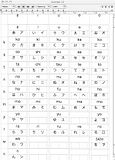 Basic Voiced Sounds 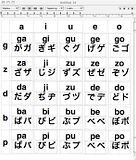 Basic Combinations 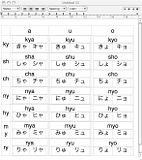 Voiced Combinations 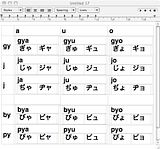 Practice Boxed Sheet 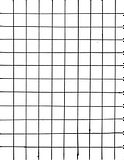 |
|
Re: Japanese Learners Club ^.^
Link |
by
 on 2007-06-24 19:34:58 (edited 2007-06-24 20:14:08)
on 2007-06-24 19:34:58 (edited 2007-06-24 20:14:08)
|
|
osu~ [hey.] watashi no namae wa betani desu. [my name is Bethany.] juu ni sai. (i thought it was sai!! but the others were saying nen. ^^") [but turning 13 in 18 days.] sakuramento ni sunde imasu. [i live in sacramento.] chugakkou hachi nen sei desu. <--hope thats right. |
|
Re: Japanese Learners Club ^.^
|
|
ã¯ã˜ã‚ã¾ã—ã¦ï½ž (Pleased to make your acquaintance [for the first time]) è–竜<<セイリュウ>>ã§ã™ã€‚(I'm Seiryuu.) å三æ³ã§ã™ã€‚今ã¯ä¸å¦äºŒå¹´ç”Ÿã‘ã©ã€ä¹æœˆã§ä¸å¦ä¸‰å¹´ç”Ÿã«æˆã‚Šã¾ã™ã€‚(I'm thirteen. I'm grade 8 as of right now, though I'll be in grade 9 in September.) ãƒãƒ³ã‚¯ãƒãƒ¼ã«ä½ã‚“ã§ã„ã¾ã™ã€‚(I live in Vancouver.) @Princess-Cookie/Betany: Replace nen with sai in your age (age is counted with sai) |
|
Re: Japanese Learners Club ^.^
Link |
by
|
|
I have double checked and nen is for *school grade* year counting and sai is for years *of age*. Maybe, I'll do a post on counters sometime... @ Seiryuu: Ni shitsumon ga arimasu. (I have two questions.) Ichi, Seiryuu san no namae ga fushigi yuugi kara ka? (One, is your name from fushigi yuugi? :P) Ni, itsu ni Nihongo no benkyoo suru o hajimeru ka? (Two, when did you start your Japanese studies?) Gomen demo, Romaji mo Kanji/Kana mo ni kaite kudasai. (Sorry, but could you write in Kanji/Kana and Romaji.) Well, you have Kanji I haven't studied in your post, so you must have been studying longer than me! :P And please if you write in Kanji/Kana use Romaji too, as I think there are some people on this thread whose computers don't understand japanese characters. Ah, I probably made some mistakes but...:P |
|
Re: Japanese Learners Club ^.^
Link |
by
|
|
Ah, sou ka? Gomen. I remember reading a Japanese dialog in a magazine's Japanese page that uses "nen" for age. Mistake or some sort of typo, perhaps? Oh, and to Nekomimi above, whose post I almost not notice, it's juu nana not juu shichi for 17.   |
|
Re: Japanese Learners Club ^.^
Link |
by
 on 2007-06-25 08:04:27
on 2007-06-25 08:04:27 |
|
for stroke counts and mixes for both Kata and Hira go to this link: http://www.yosida.com/en/katakana.html |

